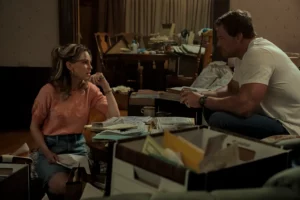Publication Date: 02-23-2024
Ordinary Angels (2024) review
Dir. Jon Gunn
By: Steve Pulaski
Rating: ★★★
Had Ordinary Angels been a fictional story, many critics, myself included, would’ve surely balked about its plot. I can see it now. I would’ve probably called it incredulous and far-fetched. Sometimes, life is stranger than fiction, and one of the countless inspiring aspects of cinema is, every now and then, you get to see a true story on the big screen that’s mostly faithful and dramatized to strong effect.
Directed by Jon Gunn (Jesus Revolution), Ordinary Angels opens by introducing us to Hilary Swank’s Sharon Stevens, a Louisville hairdresser and raging boozehound who is inspired by a newspaper article about Michelle Schmitt (Emily Mitchell), a five-year-old girl in dire need of a liver transplant. While Sharon might have a low opinion of herself, and have a serious drinking problem, she’s nothing short of a force of nature. Her empathy takes over and she becomes determined to help Michelle, her single father Ed (Arthur Ritchson), and his other, slightly older daughter, Ashley (Skywalker Hughes).
Being that the girls’ mother, and Ed’s wife, passed away in the midst of Michelle’s worsening condition, Sharon swiftly becomes the de facto mother figure to Ed’s daughters. Ed, a contract roofer, is saddled with crippling medical debt between his wife and daughter, and is armed with that distinctly male tendency of guarding his emotions and wanting to do everything by himself, no matter how shoddy the outcome. Ed’s also assisted by his mother, Barbara (Nancy Travis), but Sharon proves to have the drive and might of an entire army imbued inside of her. She negotiates with the hospital to erase the family’s medical bills, she helps him sort out the mortgage and other piling bills, and conjures up various ways to use her salon as a fervent fundraising vehicle.

One of only a handful of details writers Meg Tilly and Kelly Fremon Craig (Are You There God? It’s Me, Margaret.) embellish is that the real-life Stevens wasn’t an alcoholic (she grew up in a household plagued by alcoholism). I can only imagine the face-saving she might have to do to her loyal clients, as she still indeed remains a hairdresser. That being said, the character permits Hilary Swank to do what she does best in playing complex individuals whose motives become gradually clearer as the film continues. Alan Ritchson matches her energy by doubling down on making Ed the only thing his instincts tell him to be: self-reliant to a fault. The bills? They’ll get taken care of. He’s not selling the house. He’s going to be the father his girls deserve. Swank and Ritchson are like sharks; they have to keep swimming, for they know no other way.
How have I gone this long without mentioning that Ordinary Angels is technically a faith-based film? Because Tilly and Craig somewhat boldly make this a story about how faith inspires people as opposed to how faith defines people. Where it could spend a significant portion of its already two-hour runtime having Sharon or Barbara blab to Ed about his waning faith in God, the film instead affirms the inherent good in many of us by showing how strangers rallied to save a little girl’s life. Where many films of this ilk are often “too Christy,” Ordinary Angels shows individuals who are Christlike.
The film builds to a riveting and suspenseful third act that starts with Ed getting a call from the hospital saying a liver for Michelle has become available. Naturally, it’s in the middle of a once-in-a-blue-moon snowstorm that dumps nearly two-feet of snow onto the region, rendering travel next-to-impossible.
The creative liberty taken with Stevens aside, it’s relieving to note that the focal point of the film’s story is factual. The epilogue shows us real-life news footage of how dozens of people in Louisville came together to clear snow off of a church parking lot for a literal helicopter to land and take Michelle and Ed to the hospital with just barely enough time for the procedure to take place (a human liver is only good for six hours).
In addition to the aforementioned real-life news footage that publicized the urgency of Michelle’s procedure, the epilogue features a montage of photos of the real-life Michelle. All of the photos show her as a young girl. This struck me as odd. I could say more, but if you leave Ordinary Angels with something of a renewed sense of humanity, and consider the already nearly impossible circumstance that came true for the “1994 Louisville snow baby,” everything thereafter might just bring you back to reality.
NOTE: Ordinary Angels is now playing exclusively in theaters.
Starring: Hilary Swank, Alan Ritchson, Nancy Travis, Emily Mitchell, Skywalker Hughes, and Tamala Jones. Directed by: Jon Gunn.
About Steve Pulaski
Steve Pulaski has been reviewing movies since 2009 for a barrage of different outlets. He graduated North Central College in 2018 and currently works as an on-air radio personality. He also hosts a weekly movie podcast called "Sleepless with Steve," dedicated to film and the film industry, on his YouTube channel. In addition to writing, he's a die-hard Chicago Bears fan and has two cats, appropriately named Siskel and Ebert!


